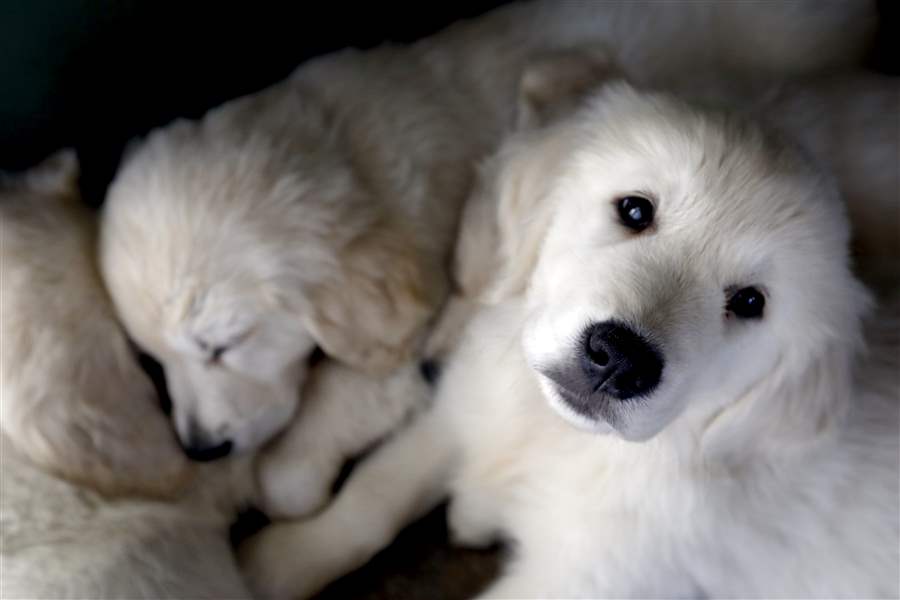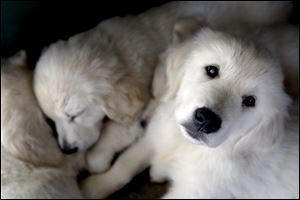
Local dog breeders, retailers react to new anti-puppy-mill law
7/6/2018
One of the latest litter of English Golden Retriever puppies bred by Richard Stroshine, a retired carpenter, peeks it head up from the air conditioning vent where its siblings sleep Thursday, July 5, 2018, at his home in Northwood.
The Blade/Katie Rausch
Buy This Image
Richard Stroshine, co-owner of Stroshine’s Studs and Buds in Northwood, is all too familiar with the horrors of puppy mills.
He bought a dog for his daughter, Allison, from one in Mansfield, Ohio, a few years ago. Severely underweight with feces caked to its tail, Mr. Stroshine said the 16-week puppy weighed half of what was normal at that age. Despite the dog’s poor health, he bought the dog because his daughter wanted to rescue it from its terrible living conditions.
“We thought to ourselves, ‘Man, this is terrible,’ so we started doing it ourselves,” Mr. Stroshine said.
Inspired by their experience with puppy mills, the father-daughter duo decided to start their own kennel two years ago to breed healthy, nurtured dogs. With the recent passage of an anti-puppy mill law in Ohio, more Ohio puppies will spend their first weeks of life in safe, comfortable environments similar to that of Mr. Stroshine’s kennel.
VIDEO: Allison and Richard Stroshine of Stroshine’s Studs and Buds
House Bill 506 establishes standards for dog breeders in Ohio and places stricter regulations on “high-volume breeders.” Local breeders and retailers interviewed expressed mixed feelings about the new law, some of which originated from misinformation about the bill’s contents.

One of the latest litter of English Golden Retriever puppies bred by Richard Stroshine, a retired carpenter, peeks it head up from the air conditioning vent where its siblings sleep Thursday, July 5, 2018, at his home in Northwood.
Kathy Eichenlaub had heard that because she had six breeding dogs, her kennel would now belong in the “high-volume breeder” category. The new law revises the fee schedule for annual high-volume dog breeder licenses by generally basing it on the number of puppies sold rather than the number of litters of puppies sold as under current law, with fees ranging from $150 to $750.
She said she would not be able to afford a high-volume breeder license and would probably have to shut down her kennel as a result of the law.
“You’re causing a large-scale breeder [that does not actually breed that many litters per year] to become one to cover the cost. It’s having the opposite effect,” Mrs. Eichenlaub said.
Mrs. Eichenlaub was surprised to learn that her kennel, in fact, would most likely not meet the new law’s criteria of a large-volume breeder. The bill defines a high-volume breeder as a kennel with six or more breeding dogs that either sells five or more dogs to pet retailers, sells 40 or more puppies to the public, or at any given time houses more than 40 puppies younger than 4 months on its premises, in a given calendar year.
Larry Snow, owner of Snow’s Poodles & Doodles, on the other hand, initially voiced his approval of the law but was surprised to find that his kennel might have retroactively qualified as a high-volume breeder under the new law. Last year his six dogs bred about 60 puppies.
“I’d probably challenge that number a little bit. I don’t breed the dogs every cycle,” Mr. Snow said. “A lot of people will breed the dogs every cycle.”
Still, Mr. Snow maintained his support for extra regulations on high-volume breeders, since he is “terribly against” puppy mills. He admitted, though, that it is easy for him to say because the new law will not apply to him. He plans on shutting his kennel down after his last litter is born this month so he can enjoy his dogs as pets.
Mr. Stroshine had not even heard of the law when The Blade contacted him. But he said he approved of the new law's intent to stop puppy mills from abusing dogs.
The new law doesn’t just affect certain dog breeders. Ohio pet retailers or dog brokers now must require their suppliers — including those outside Ohio — to sign a document attesting they comply with Ohio’s standards of care when it comes to the feeding, housing, veterinary care, exercise, and human interaction of their animals.
John Stottele, owner of the Family Puppy pet store chain in Northwest Ohio and Southeastern Michigan, called the new bill “wonderful.” Family Puppy’s Toledo location has been the subject of controversy since its opening in October, 2013, with advocates arguing that pet stores get puppies from puppy mills. But Mr. Stottele asserted that the Family Puppy’s breeders will meet the standards set for high-volume breeders “without any problems.”
Contact Adelaide Feibel at afeibel@theblade.com, 419-724-6050, or on Twitter @AddyFeibel.